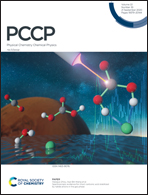Electron spin polarization transfer induced by triplet–radical interactions in the weakly coupled regime†
Abstract
We report the observation of electron spin polarization transfer from the triplet state of a porphyrin to a weakly coupled nitroxide radical in a mutant of human neuroglobin (NGB). The native iron-containing heme substrate of NGB has been substituted with Zn(II) protoporphyrin IX and the nitroxide has been attached via site-directed spin labeling to the Cys120 residue. A reference synthetic polypeptide with free base tetraphenylporphyrin and a nitroxide bound to it is also studied. In both systems the nitroxide and the porphyrin are held at a fixed distance of approximately 2.4 nm. The transient EPR data of the NGB sample show that the triplet state of Zn(II) protoporphyrin acquires significant net polarization, which is attributed to the dynamic Jahn–Teller effect. As the spin polarization of the protoporphyrin triplet state decays, a polarized EPR signal of the nitroxide arises. In contrast, the free base porphyrin in the reference polypeptide does not acquire net polarization and no polarization of the nitroxide label is observed. This is likely a result of the fact that the porphyrin is not Jahn–Teller active because of its lower symmetry. A perturbation theory treatment suggests that in the NGB sample, the polarization of the radical occurs by the transfer of net polarization from the triplet state. This process is also enhanced by the spectral broadening caused by the back and forth transitions associated with the dynamic Jahn–Teller effect. We propose that the novel transfer of polarization to the radical could be exploited to enhance the sensitivity of light-induced dipolar spectroscopy experiments.



 Please wait while we load your content...
Please wait while we load your content...